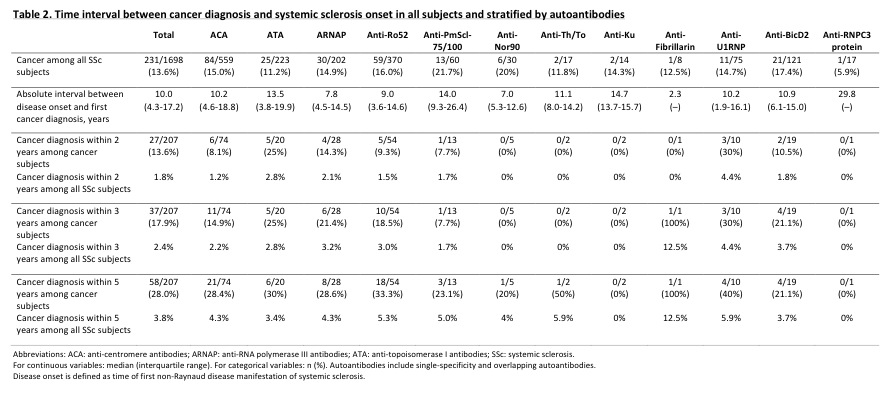Session Information
Session Type: Poster Session C
Session Time: 9:00AM-11:00AM
Background/Purpose: Autoantibodies are useful in systemic sclerosis (SSc) for predicting disease course. Some autoantibodies have been associated with a close temporal relationship with cancer. We investigated the association between SSc-specific and SSc-associated autoantibodies and cancer in a national registry.
Methods: Subjects recruited between 2004 and 2019 in a national SSc registry were studied (96% fulfill 2013 ACR/EULAR SSc classification criteria). The exposure was presence of SSc-specific/associated autoantibodies, namely anti-centromere (ACA), -topoisomerase I (ATA), -RNA polymerase 3 (ARNAP), -fibrillarin, -Th/To, -PM-Scl, -Ku, -U1RNP, -NOR90, -Ro52, -RNPC3 and -BICD2. The primary outcome was cancer-associated SSc, defined as cancer occurring within 2, 3 and 5 years of first non-Raynaud SSc manifestation. Univariate logistic regression was used to compare the odds of cancer-associated SSc between the autoantibody subgroups, using anti-centromere as reference. Descriptive statistics were used to compare clinical characteristics of subjects with cancer to those without cancer.
Results: Out of 1698 SSc subjects, 1474 (86.8%) had at least partially available autoantibody data. Mean (SD) age was 55.3 (12.3) years, 87% were female and 59% had a smoking history. Table 1 shows baseline characteristics stratified by autoantibodies. Cancer was diagnosed in 231 (13.6%) subjects. Median (IQR) time between cancer and disease onset was 7.0 (-0.7 to 16.4) years.
Table 2 shows the prevalence of cancer diagnosed within 2, 3 and 5 years of SSc onset, stratified by autoantibodies. Among 207 cancer subjects with available time data, 27 (13.6%), 37 (17.9%) and 58 (28.0%) were diagnosed with cancer within 2, 3 and 5 years of SSc onset. The most frequent types of cancers diagnosed within 5 years were breast (n=13), non-melanoma skin (NMSC, n=12), cervical/uterine (n=9) and hematological (n=8) cancers.
Overall, among all SSc subjects, no autoantibody was predictive of cancer-associated SSc (Table 3). However, ATA-positive subjects were more likely to have a solid cancer excluding NMSC (OR 6.6, 95% CI 1.4-46.4), especially breast cancer (OR 7.9, 95% CI 1.0-159.2), within 2 years of SSc onset. The risk of cancer-associated SSc was not significantly increased among ARNAP-positive subjects, although for solid cancers excluding NMSC, the OR was 5.8 (95% CI 0.56-125.8). Furthermore, subjects positive for at least 3 autoantibodies were more likely to develop cancer within 5 years of SSc onset compared to subjects with 1 or 2 autoantibodies (OR 3.0, 95% CI 1.3-6.1). Subjects who developed cancer within two years of SSc onset were generally younger (51.8 vs 57.9 years) and more frequently had a history of smoking (72% vs 59%) and scleroderma renal crisis (11% vs 3%).
Conclusion: In this study, ATA and overlapping autoantibodies were predictive of cancer-associated SSc for solid cancers excluding NMSC. Breast cancer was the most frequent type of cancer detected within 5 years of first non-Raynaud manifestation. Autoantibodies may help guide the approach to cancer screening. Larger studies are needed to define the risk of cancer-associated SSc within rarer autoantibody subgroups.
 Table 1. Baseline characteristics for all subjects and stratified by autoantibodies
Table 1. Baseline characteristics for all subjects and stratified by autoantibodies
 Table 2. Time interval between cancer diagnosis and systemic sclerosis onset in all subjects and stratified by autoantibodies
Table 2. Time interval between cancer diagnosis and systemic sclerosis onset in all subjects and stratified by autoantibodies
 Table 3. Univariate logistic regression analyses for the risk of cancer within 2, 3 and 5 years of systemic sclerosis onset according to autoantibody status
Table 3. Univariate logistic regression analyses for the risk of cancer within 2, 3 and 5 years of systemic sclerosis onset according to autoantibody status
To cite this abstract in AMA style:
Lazizi S, Hudson M, Baron M, Fritzler M, Hoa S. Associations Between Autoantibodies in Systemic Sclerosis and Cancer in a National Registry [abstract]. Arthritis Rheumatol. 2020; 72 (suppl 10). https://acrabstracts.org/abstract/associations-between-autoantibodies-in-systemic-sclerosis-and-cancer-in-a-national-registry/. Accessed .« Back to ACR Convergence 2020
ACR Meeting Abstracts - https://acrabstracts.org/abstract/associations-between-autoantibodies-in-systemic-sclerosis-and-cancer-in-a-national-registry/
